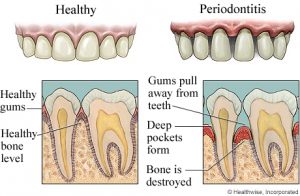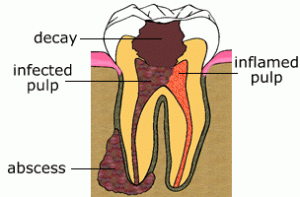A general dentist will refer to a specialist to compliment or enhance the oral care a person is receiving. Depending on whether the interior of the tooth is the problem or the surrounding gum tissue, the services of an endodontist or periodontist may be required. The referral is often for both diagnosis and treatment and occasionally for a diagnosis and a professional opinion.
A periodontist specializes in the treatment of gums and everything to do with them. For example, if you have mild or severe gum disease, periodontics can be used to treat the condition by performing a deep cleaning or scaling and planing procedure and if that doesn’t work, a gum graft may be necessary. A gum graft is an oral surgery where tissue is taken from the roof of your mouth or a tissue donor and attached to your receding gums so that they can be re-secured to your tooth. A periodontist will typically perform dental implant surgery as well since this procedure requires superior knowledge of how to cut into the gums with as little trauma as possible.
An endodontist, on the other hand, specializes in the interior tooth structure or the dental pulp. If your tooth becomes severely infected, an endodontist can make a small hole in the tooth in order to remove the infection prior to cleaning the area and sealing up the hole. At times, an endodontist will also remove the roots while completing root canals. This procedure makes it possible to save the tooth that was infected rather than being forced to pull it.
Both endodontists and periodontists work closely with general dentists to ensure that patients receive quality care.
Who should see a periodontist?
 A general dentist can manage most simple periodontal needs. However, a complex medical history or aggressive periodontitis may necessitate an increased level of expertise by a trained specialist.
A general dentist can manage most simple periodontal needs. However, a complex medical history or aggressive periodontitis may necessitate an increased level of expertise by a trained specialist.
A dentist will usually refer certain cases to a periodontist that include:
- Those with poor compliance after treatment of active periodontitis.
- When generalized or localized aggressive disease is present, for example aggressive periodontitis.
- When complex treatment planning is required, for example combined periodontal and endodontal problems.
- Planning of fixed prosthodontics and implants for periodontal cases.
- Those with predisposing medical conditions, for example organ transplant patients.
- Those at risk of complications from dental treatment.
Who should see an endodontist?
 A general dentist can manage most simple endodontal needs but more complex cases that require root canal therapy in teeth with multiple root configuration or surgical procedures would need the expertise of a trained specialist.
A general dentist can manage most simple endodontal needs but more complex cases that require root canal therapy in teeth with multiple root configuration or surgical procedures would need the expertise of a trained specialist.
A dentist will usually refer certain cases to an endodontist that include:
- Complex root canal treatment procedures.
- Abscessed tooth that require surgical procedures.
- When complex treatment planning is required, for example combined periodontal and endodontal problems.
- Those with predisposing medical conditions, for example organ transplant patients.
- Those at risk of complications from dental treatment.

Leave a Reply